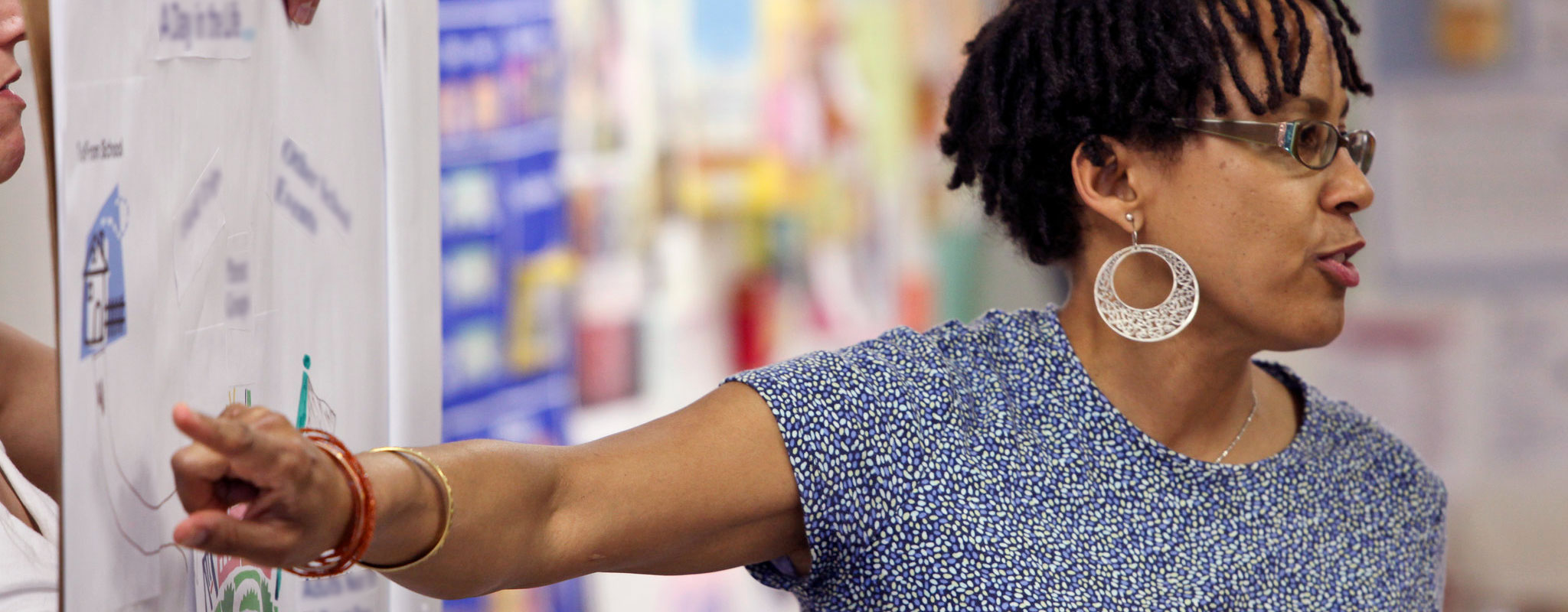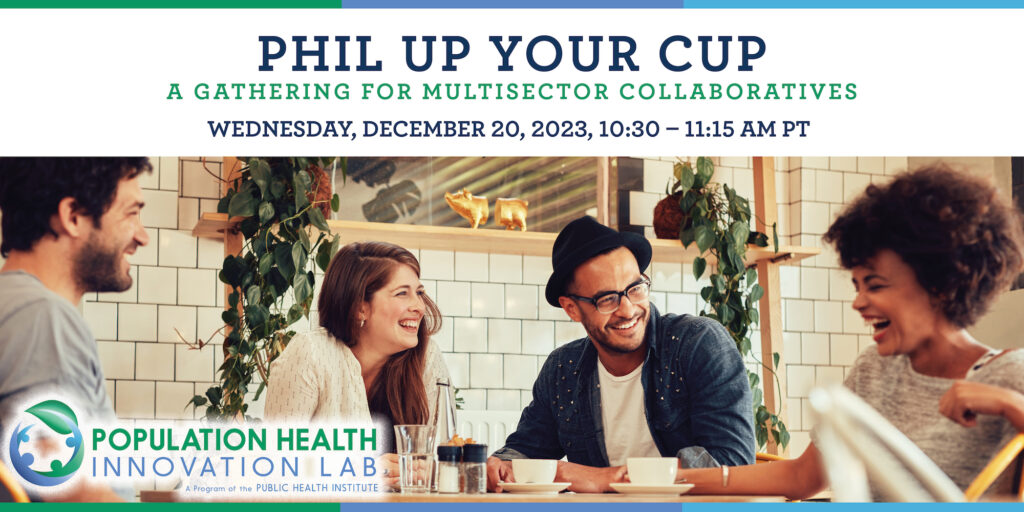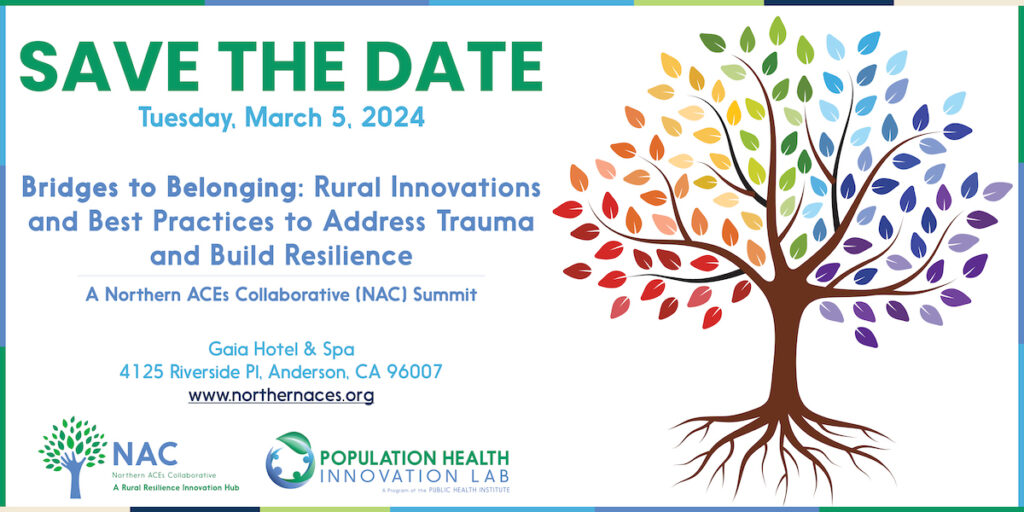Events
PHIL Up Your Cup: A Gathering for Multisector Collaboratives
The Population Health Innovation Lab (PHIL), a program of the Public Health Institute, invites you to join us at “a third place” for multisector collaboratives: PHIL Up Your Cup!
The last virtual session was held on Wednesday, January 24, 2024, from 10:30 – 11:15 am PT.
During this event, we’ll be joined by Julie Lawrence, CEO and Co-Founder of Eviset, who will invite us to consider and discuss how to leverage for-profit businesses and the lessons learned from this sector to improve public health impact.
Julie Lawrence is CEO and Co-Founder at Eviset, the leading provider of business intelligence on key performance indicators for social care providers. She has deep expertise in leveraging data and patient experience to improve health practice across medical and social care. Trained as an MBA at the Wharton School and as a Fellow at Stanford’s Clinical Excellence Research Center, Julie has a particular passion for how for-profit market incentives can be a force for good in health care and drive rapid scaling of improvements in health care quality and cost. She currently serves on the national Partnership to Align Social Care work group, Start-up Advisor at UC Berkeley’s SkyDeck Accelerator, Board Member of Wharton Alumni Angel Investors, and is an Affiliated Scholar at Stanford’s Clinical Excellence Research Center.
PHIL Up Your Cup provides a comfortable and inviting space for practitioners involved in multisector collaboration. Think of it as a café where your soul is nourished and meaningful conversations flow. Our focus is on increasing success in advancing health, well-being, and equity.
PHIL Up Your Cup serves as an informal and supportive space that encourages experimentation, risk-taking, and genuine, open conversations without judgment. Along the way, PHIL will share our knowledge, provide insights, and draw upon our extensive experience in developing effective strategies for advancing equity and community health. So go ahead, fill up your physical cup, join us, and let your cup be PHILed.
What to Expect?
PHIL is piloting PHIL Up Your Cup as a series of 30-45 minute meetups, occurring approximately every six weeks or so.
We envision PHIL Up Your Cup as a dedicated platform for health-focused multisector collaboratives from across the country to convene, exchange insights, and learn from one another.
During these gatherings, participants will engage in conversations centered around topics of mutual interest. These discussions may encompass a wide range of subjects such as community engagement, skill building, research, and more. The aim is to provide a comfortable environment that caters to the unique needs and preferences of the multisector collaborative participants.
Our primary goals for PHIL Up Your Cup are to facilitate knowledge sharing, promote best practices, and encourage collaborative problem-solving. By fostering an atmosphere of open dialogue, we hope to inspire innovation, accelerate progress, and address common challenges within the field.
We facilitate learning opportunities and monitor the field to capture webinars, meetings, conferences, and other events relevant to fostering multisector collaboratives that address health, well-being, and equity.
We encourage you to visit our Eventbrite page to register for upcoming MSC-related opportunities. Make sure to also check our PHIL YouTube to access our previous webinar discussions.
Past Events
Improving Population Health Through Multisector Collaboration: A Three-Part Series
In this three-part series, Improving Population Health through Multisector Collaboration, the Population Health Innovation Lab team, joined by community practitioners, shared discoveries about aligning systems from working with Accountable Communities of/for Health (ACHs) in California and Washington.
To start off the series, we presented the three most impactful approaches for aligning systems for health identified through PHIL’s research. These approaches are further explored in a series of six briefs. Next, PHIL hosted a panel discussion with ACH leaders who shared stories, provide examples, and answer your questions about aligning. Finally, we guide you through our curated collection of resources–including stories, statistics, quotes, examples, definitions, ideas, reports, videos, and articles–focused on multisector collaboration for improved population health.
Advancing Equity: Adapting to Local Context and Confronting Power Dynamics
The Population Health Innovation Lab’s (PHIL) Division of Research and Network Science was joined by representatives from Accountable Communities of/for Health (ACHs) in Washington and California on Thursday, June 2 for a special web discussion entitled “Advancing Equity: Adapting to Local Context and Confronting Power Dynamics. Lessons learned from Accountable Communities of/for Health.”
This discussion featured recent research findings which answer the question, “How do local context and power dynamics influence an ACH’s ability to make progress toward improved equity?” It is intended for those interested in learning more about PHIL’s Aligning Systems for Health research, as well as on-the-ground practitioners interested in learning about new strategies for advancing equity.
Key findings show the role local context and power dynamics play when ACHs specifically – and multisector collaboratives broadly – seek to improve equity. This event featured a panel of experts from diverse ACHs across Washington and California who shared examples of how they are adapting to local context, confronting power dynamics, and using concrete strategies to advance equity in their communities.
Informational Web Discussion: PRACTICE Request for Proposal (RFP)
The UCLA-UCSF ACEs Aware Family Resilience Network (UCAAN), in collaboration with the Office of the California Surgeon General (CA-OSG), Department of Health Care Services (DHCS), and Population Health Innovation Lab (PHIL), a program of Public Health Institute (PHI), are pleased to announce a third round of ACEs Aware grant funding called PRACTICE: Preventing and Responding to ACE-Associated Health Conditions and Toxic Stress in Clinics through Community Engagement. This web discussion provided an opportunity to learn more about this funding opportunity.
Network, Partner, and Relationship Mapping: How Kumu Can Help Multisector Collaboratives Tackle Complexity”
The Population Health Innovation Lab held a web discussion with Jeff Mohr, Co-Founder and CEO of Kumu, on Thursday, February 17, entitled “Network, Partner, and Relationship Mapping: How Kumu Can Help Multisector Collaboratives Tackle Complexity.”
There are many different purposes for mapping a network – enabling new collaborations, identifying gaps, building relationships, and more – but knowing the best approach and which tools to use can be a challenge. This web discussion will feature Kumu, a network and system mapping platform, and show how this type of tool makes it easy to organize complex data into relationship maps that are beautiful to look at and tell compelling stories. In addition, they recently launched Sticky Studio, a real-time collaborative whiteboard; and, Weavr; a gathering place for your community to connect, collaborate, and grow. Learn how using Kumu’s visualization and social network analysis technology can ensure collaboratives focus on the relationships that matter and the work they enable.
Presentation Objectives:
Measuring Aligning Across Sectors
The Population Health Innovation Lab (PHIL) held a web discussion with Daniel Lanford, Senior Research Associate at the Georgia Health Policy Center on Thursday, February 10, 2022, entitled “Measuring Aligning Across Sectors.”
Multisector collaboratives need practical tools and metrics to assess the success of their aligning efforts. They need to know what to measure, how to measure it, how to collect and analyze reliable evidence, and share their findings in a timely and useful manner. This web discussion describes findings from PHIL’s recent study assessing the reliability, validity, feasibility, and utility of core aligning measures. We discuss key learnings such as new concepts that emerged through this research and relationships discovered between components of the Framework for Aligning Sectors. Attendees previewed PHIL’s Toolbox for Measuring Cross-Sector Alignment and discussed how their collaborative(s) might engage with this exciting resource.
Presentation Objectives:
- Describe the process and results of a study validating measures for aligning across sectors.
- Explore PHIL’s Toolbox for Measuring Cross-Sector Alignment.
- Discuss how to measure, collect, and analyze reliable evidence to tell compelling stories about your communities.
Our Polluted Media Landscape: Sensemaking for Misinformation Management in Community Health
The Population Health Innovation Lab held a web discussion, “Our Polluted Media Landscape: Sensemaking for Misinformation Management in Community Health,” on Thursday, January 13, 2022 from 12:00 – 1:30 PM, led by Josh Gryniewicz, Founder/Chief Narrative Strategist for Odd Duck. Josh is an author and health communicator, who founded a storytelling for social change consultancy program. This web discussion addressed how communities, Accountable Communities of/for Health (ACH) leaders, multisector organizations, and health professionals can achieve their goal of healthy outcomes while managing the dual crises of an ‘infodemic’ and a pandemic. Learn how multisector community health organizations are successfully crafting community forward responses for misinformation, disinformation, and conspiracy theories using the five (5) keys for management.
Presentation Objectives:
- Provide an overview of the Infodemic and our polluted media ecosystem.
- Learn the difference between misinformation, disinformation, and conspiracy theories.
- Understand the five keys for managing misinformation that ACH leaders, multisector organizations, and other health professionals can begin applying immediately.
Meet Our Presenter: Josh Gryniewicz, Founder/Chief Narrative Strategiest, Odd Duck
Josh is an author, a health communicator, and the Founder/ Chief Narrative Strategist of Odd Duck, a storytelling for social change consultancy. Over a decade ago, he started his communication career in the public safety space working on a controversial violence prevention program. Today, Odd Duck specializes in population health and mental wellness. He has helped cultivate narrative strategy for disruptive healthcare organizations, innovated unique content, including a comic book platform for depression prevention in teens, and presented storyteller trainings for multisector data sharing collaborations across the country. Over the past two years, Josh has contributed to community-forward COVID-19 responses in Black and Brown communities throughout Chicago, Baltimore, New York, Philadelphia, and New Orleans. This work informed the five keys for managing misinformation, which he has used to advise organizations on developing counter-narratives for anti-vaccine and vaccine hesitancy programs and crafting community-forward responses.
Shaping Change Using Targeted Universalism in a Multisector Collaborative
On Tuesday, September 21, the Population Health Innovation Lab held a web discussion about how North Sound Accountable Community of Health is applying Targeted Universalism to their multisector work!
Presentation Objectives:
- Provide an overview of Targeted Universalism (TU), its relationship to an overarching goal of equitable well-being in the North Sound region of WA State
- Share varied examples of implementing TU in North Sound ACH (contracting, finance, project and partner selection) – successes and challenges
- Provide an opportunity for ACH leaders and other participants to be in dialogue and learning around equity, TU and their own successes and challenges
Community Perspectives on ACH Value
The Population Health Innovation Lab held a web discussion on Thursday, September 23, 2021 to hear and others perspective on the value of Accountable Communities of/for Health and Accountable Health Communities!
This is an interactive meeting focused on ACH value from the perspective of Accountable Communities of/for Health (ACHs), Accountable Health Communities (AHCs), BUILD Health communities, and other health-focused multisector collaboratives (MSCs). The virtual convening will build on the “Lessons Learned from the Accountable Community for Health Model” webinar hosted by the Funders Forum on Accountable Health on August 24th and will offer a space for those working on the ground in ACHs, AHCs, and other MSCs to reflect on what they heard at the Funders Forum webinar and to share their own thoughts on the value of accountable health.
2021 Rural ACEs Virtual Summit
The second virtual summit was held on Wednesday, September 29 – 30, 2021, to raise awareness and understanding around adverse childhood experiences (ACEs). This summit hosted by the Northern ACEs Collaborative (NAC) included featured presentations and interactive breakout sessions to explore emerging best practices and solutions to address ACEs.
21st Century Decision Making in a Multisector Collaborative
On Tuesday, October 5, 2021, the Population Health Innovation Lab hosted Loomio, a collaborative digital workspace for sharing proposals, information, and outcomes for decision making.
Those who steward the work of multisector collaboratives or Accountable Community for/of Health are sometimes called “backbone leads.” Backbone leads are tasked with many duties such as:
- Securing decisions
- Engaging and distributing power (responsibility and accountability)
- Fundraising
- Prioritizing work/effort
This can be challenging work, however, having the right tools can help! Join us as we explore Loomio: a collaborative digital workspace for discussion and decision making.
Learning Objectives:
- See and explore how Loomio can be used in collaborative decision-making
- Describe concrete examples of how an online collaborative tool can support the work of multisector collaboratives
Stories from the Accountable Communities of Health Field
Sue Grinnell, Laural Ruggles, and Kari White share stories about NEK Prosper!, which has been working to improve the health and well-being of everyone in Caledonia and Southern Essex Counties of Vermont.





